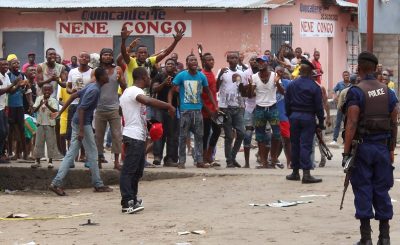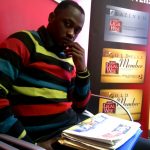John Bompengo
By
Brian Minga Amza
For many years, the youths have always been the playground of different society’s actors in the Democratic Republic of Congo, going from businessman, politicians, musicians…due to the excessive rate of unemployment, many of these young people developing a certain dependency toward those who society recognises as successful people, mainly called “mopao”, Congolese jargon which means a rich man.
Among these people you will find a business man like Didi Kinuani, who causes traffic jams by merely passing a street. The man on the street knows some dollars will be left behind on his passage, rather be in the right place at the right time, where better than on the street, celebrities as well find the same applause from young people, celebrities who can afford to spend, to “pakola” (term used in Kinshasa when someone gives without being asked to), according to some confidence in the celebrity’s circle, it has become a must to carry some cash when going out, otherwise stay indoors, your reputation depends on it. Because by giving to them, you expect in return certain favours, which dependant on the circumstances, or nature, most of the time the amount given can barely buy a meal for a day.
But those who really benefit from the situation are politicians, easy votes to get, easy to manipulate for their own agenda, mainly easy to erase if they become a treat, so the situation is just too comfortable, and for many years no one has ever tried to question the role of this force (the youth) in Congolese society.
During his 32 year reign, Mobutu made sure that youths should not discuss at all or get involved in politics by implementing various arbitrary constraints on freedom of speech and information, for instance L Mukanda Mundane, journalist and Journal Renaissance‘s CEO, was arrested and his journal banned, only because he attempted to address the issue of ethnicity in Mobutu’s government, and we are nearly in 1966-1967, at the first hours of mobutu’s reign, a good example will be of the students from Unikin (University of Kinshasa) who will be shot by Mobutu’s bodyguards during a peaceful march on 4 June 1969, the reason stated by M Kandolo Wa Kashala, who was student representative at Lovanium U niversity (Unikin): the students crossed the line by talking about politics, that was unacceptable for Mobutu’s regime. He then closed the university for one year and enrolled over 2000 students in the army by force. Similar events will occur in 1990, just to name a few…
Regarding the recurrent situation of the DRC, as a youth you have more chance of getting arrested by the government than killed by a rebel group, the government has invested lately so much energy in cracking down on youth activists to the extent where a simple Facebook post can turn you into a public enemy. Just to name a few, on the 20th June 2015, a youth attorney Godefroid Mwanabato was arrested by the Congolese government and accused of insulting the President and his government, this in addition to subversive activities demanding the release of youth activists who have been jailed since March 2015 by Kinshasa’s regime. The most recent case, Jean Marie Kalonji a young activist was kidnapped in broad daylight by armed men in central Kinshasa, where he was accused of posting on Facebook that he was against the national dialogue called by President Kabila. Since then he has been detained in one of the most brutal and inhumane holding cells at Congo’s National Intelligence Agency (ANR).
This increase of arbitrary arrests portrays well that Congolese youths have decided to take their destiny in their own hands, braving one of the most brutal regimes in central Africa. When one could only ignore the state of the nation, they are engaging with what is only left for them: ambitions to change the future. As Alan Moore once said: “People shouldn’t be afraid of their government. Governments should be afraid of their people.”



No Comments Yet!
You can be first to comment this post!